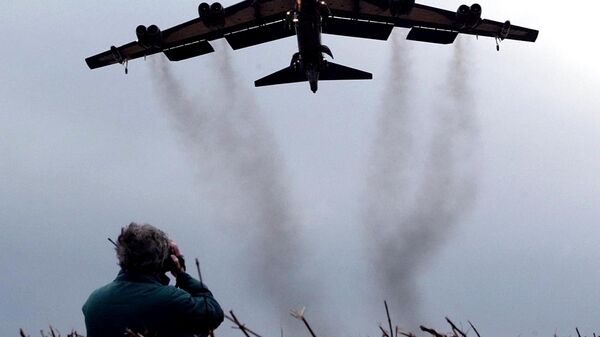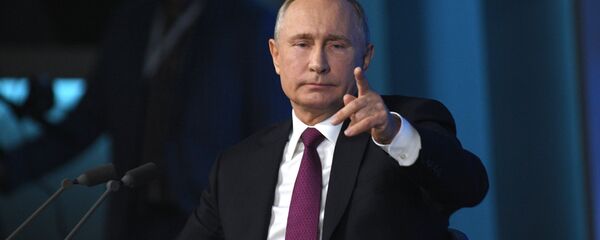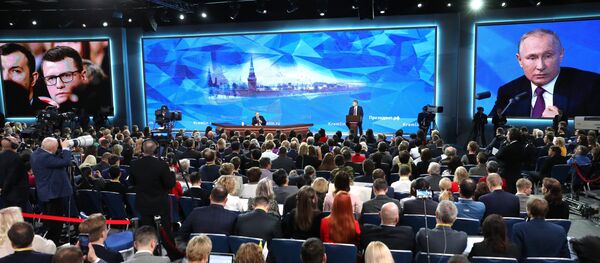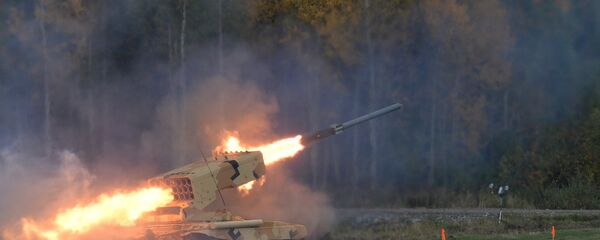The event was the first since the beginning of President Putin's new presidential term, which began in May. A record number of journalists, over 1,700, had received accreditation for the press conference, according to the Kremlin.
Some two-thirds of the reporters were from various Russian regions, while the rest represented foreign media outlets. During the press conference, President Putin addressed a number of pressing domestic and international issues, including Washington's latest decision to withdraw US troops from Syria.
Sputnik: So, what were your impressions from this year's press-conference by the Russian President? What did you hear, or how did you interpret, what he said about the direction of Russian international policy?
Professor: Nothing new, overall. He simply highlighted and maybe crystalised in a better formula what it is that he sees as the main problems that Russia is going to face, but he didn't add any novel interpretations, or, say, anything new. That would be my assessment.
READ MORE: Most Eye-Catching Moments From Putin's Big Press Conference
Sputnik: Okay, what would you say about US-Russian relations, judging from what you've heard at the press conference?
Professor: You know, there is a saying, which I like. It's: "an optimist believes, things couldn't get any worse, but a pessimist is sure that they can". I guess I'm a pessimist. Things can certainly get worse and I expect that they will in Russian-American relations.
Sputnik: Wow, that's not very good. Do you think that there is no political will on the two sides to improve relations, or is there some way that the two sides are benefiting from the standoff?
To cut, sort of, to the chase and to add concreteness to this picture: the military industrial complex, which Eisenhower talked about more than 40 years ago, is a key actor in this and on both sides, in Russia and in the United States. They benefit greatly from this ramping up of tensions because it's money, money, money.
Sputnik: Wow, but what about these questions that yesterday was asked. People were saying: we're once again afraid of the possibility of a nuclear war. Putin talked about nuclear weapons and the fact that the US is pulling out of the INF. Do you think that the dispute over nuclear weapons between Moscow and Washington can be resolved, or at least that can be resolved, so we don't blow the world up?
Professor: We know exactly, everybody knows, we've studied it in textbooks, how to reach agreements over nuclear weapons. It's through direct negotiations, but there cannot be any successful negotiations about nuclear weapons, or anything else without a minimum level of trust, going into these negotiations.
It struck me, it sounds bizarre, but, although we have more information now about each other due to our national technical means of surveillance, we don't have to trust, but verify, as Reagan said. We have our own verification systems in place.
So, all that's lacking is the trust and the problem is, that although we have all this information, we are more mistrustful of each other than ever before and I think that's mainly the result of paranoia.
READ MORE: Moscow Warns UNGA Rejection of Resolution on INF Treaty Damages Int'l Security
Sputnik: Right, what can you say about Moscow-UK relations? Are they just as bad, or worse?
Professor: Historically, Britain has always seen Russia globally as its main rival. I think, the Cold War in many ways can be conceptualized as Churchill's revenge for the loss of empire; because at his famous Fulton, Missouri speech he actually introduced the United States as the successor to the British Empire and hoped to see all these bases around the world becoming joint bases, to which the power of the British Empire could be maintained, but slowly transferred to the United States.
Sputnik: So, how dangerous is the potential withdrawal of various parties from bilateral and multilateral arms treaties? What global consequences can this lead to?
Professor: Well, it's my view that an arms race, per se, is not dangerous. It's expensive and stupid, but it's not dangerous. The danger arises from the procedures that are in place to use weapons. These procedures are incredibly technical now, as are the weapons themselves. Therefore, they require a high level of interpretation by local commanders. In the past to prevent escalation, local commanders have simply refused orders to fire.
READ MORE: US Seeks to Change Nuclear Missile Balance in Its Favour — Security Council
There are several examples, perhaps, the two best known are Vasili Arkhipov, a Soviet naval officer, who voted against a Soviet nuclear strike during the Cuban missile crisis, but on the western side, in the Balkans, people often don't remember that in August of 1999 General Sir Michael Jackson overruled his NATO supreme commander General Wesley Clark's orders to seize the Pristina airport before the arrival of Russian troops there.
With so many conflicts, involving so many military personnel now, we may not always be so lucky. Once executed, again, given the incredibly technical procedures, it's not clear that escalation could be stopped. And I think that's really the message in Putin's discussion of this.
Views and opinions, expressed in the article are those of Nicolai Petro and do not necessarily reflect those of Sputnik




